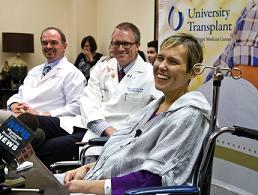
JACKSON – (AP) As cameras and microphones edged in and the room grew quiet, University of Mississippi Medical Center transplant surgeon Christopher Anderson turned to face Karen Battle and her new liver.
“All right,” he said. “It’s your show.”

It was a spotlight moment 22 years in the making. When Battle, a lifelong south Jackson resident, got a new liver in March, it signaled new life not just for the 36-year-old mom, but for UMMC’s long-dormant liver transplant program.
In late February, Battle and two members of her transplant team – Anderson, associate professor of surgery and division chief of transplant and hepatobiliary surgery, and associate professor of medicine and hepatologist Dr. Brian Borg – shared their stories before Battle got to go home, just 10 days after surgery.
“I feel like I’ve won the lottery,” said Battle, sitting in a wheelchair, her hands folded and a soft smile on her face. “I feel like my life is a new adventure.”
And while in UMMC’s ICU, her kidneys failing and drifting between confusion and unconsciousness, Battle was so gravely ill that Anderson and Borg weren’t sure she’d even be a candidate for a transplant. “She was straddling the fence,” Anderson said.
“I had no life,” said Battle, diagnosed in 2009 with autoimmune hepatitis. “I was always physically exhausted.”
And then, Anderson’s phone rang shortly after midnight March 4. A matching organ was available. Based on a report of the liver’s condition and knowing that Battle had little time, Anderson said, they said yes to the offer.
The clock was ticking. Anderson even sent his transplant partner, assistant professor of surgery Dr. Mark Earl, to procure the organ, better ensuring its quality and hastening the transplant time line. “A transplant surgery is about 90 percent logistics,” Anderson said.
The team was positioned: Doctors. Nurses. Anesthesiologists specially trained for transplant. A plethora of support staff from throughout the hospital. Surgery began before midnight, wrapping up in the wee hours of March 5.
Confidentiality rules prevent UMMC from revealing who donated an organ or from where it came.
“When we left the OR, I realized she was probably going to do just fine, the way she was looking,” Anderson said. “No one anticipated our first liver transplant to have all of these variables, but it did. It wasn’t a run-of-the-mill transplant. We were on edge.”
Said Borg: “Her case was not the easiest one, but with the help of teamwork, it was a success story. It’s really good to see a person like Karen benefiting from this first surgery.”
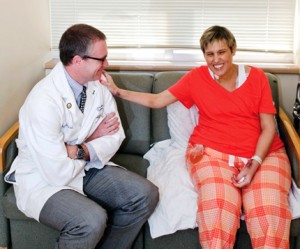
In August 2011, Anderson left St. Louis’ Barnes Jewish Hospital and the nearby St. Louis Children’s Hospital after being recruited by UMMC to jump-start its liver and kidney transplant programs. UMC’s heart transplant program had been operating for two decades, but there had been no liver transplants since 1991.
The kidney program wasn’t meeting demand, with 50-80 performed annually, yet another 100 patients having to leave the state.
“In general, the physicians and surgeons required to run a liver program left the university,” Anderson said. “At that point in time, there must not have been the vision that the program was a priority.”
Anderson spent the next year and a half painstakingly recruiting a transplant team and putting in place a support staff. The last regulatory hurdle was cleared in late January with final liver transplant approval from the United Network for Organ Sharing, which governs all organ transplantation in the country.
Battle’s care was being handled by doctors at Vanderbilt University in Nashville in the absence of a liver transplant program at UMMC. One of her doctors called him, Anderson said, knowing the UMMC program was reforming. “Would you be willing to see her?” the doctor asked Anderson.
Battle was physically and emotionally exhausted. She’d traveled between liver specialists, most recently at Vanderbilt, but also at Tulane Medical Center and Ochsner Medical Center in New Orleans.
“I said, `Of course,”’ Anderson said.
The timing was unique. UMMC’s program got the nod from UNOS; Battle’s condition rapidly deteriorated.
“God planted them (Anderson and Borg) for me,” Battle said.
She longs to meet the family of her donor, whose organs saved not just Battle’s life, but others.
“If it wasn’t for this donor and the family giving up this precious gift, I wouldn’t be here,” said Battle, whose father donated his corneas for transplant.
Could be, Anderson said, that his team will perform 10-15 liver transplants in 2013. There wasn’t a transplant scheduled that Thursday, but like in Battle’s case, that can change overnight.
In recent years, 50 to 60 Mississippians have been forced to leave the state to get liver transplants, said Kevin Stump, director of the Mississippi Organ Recovery Agency.
“We’re all high-fiving each other that we’ve done so well so far, but a young program is a very fragile program,” Anderson said. “The pace of transplants is hard to predict.”
Her celebration of new life beckons, Battle said. “I’m ready to conquer the world. I’m ready to climb the mountain.”

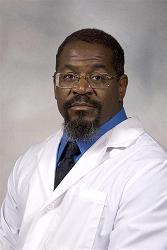
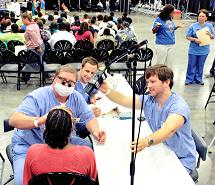
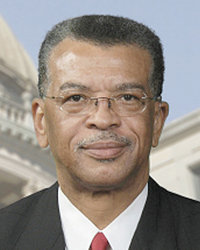
Be the first to comment